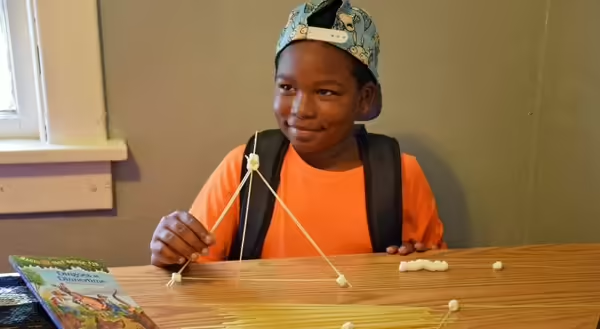
Afterschool programs have been a reliable source of support to young people and families who are balancing remote school or work, dealing with the health and economic stressors created by the pandemic, and managing the toll that COVID-19 is taking on their mental health and overall well-being (Afterschool Alliance, 2021). 4-H programming in the University of Illinois Extension Fulton-Mason-Peoria-Tazewell Unit has been fortunate to continue to partner with local afterschool programs during the pandemic, both with virtual and kit-based programs early in the pandemic and now back at several of the sites.
4-H afterschool partnerships during the pandemic engaged 75 youth at Proctor Center, Friendship House, Lincoln Middle School, and Calvin Coolidge School. Youth in the programs participated in science, technology, engineering, and math (STEM) programs that included learning about their carbon footprint through building atmospheric models, discovering how energy works by creating simple circuits, and designing rollercoasters to learn about engineering design. At the end of the roller coaster engineering activity, one of the participants said it was his favorite activity because, “ finally getting it to work was the best! I never thought we would get it to work, but when it finally did, that was so fun!” Instilling soft skills such as problem-solving, persistence, and teamwork are a big part of all of the activities 4-H provides at the afterschool sites.
Program Manager Lyndsie Gravemeir, of Goodwill Industries, also shares the importance of these skills when she reflected on their partnership with 4-H at Lincoln Middle School. “Our afterschool partnership with 4-H has provided so many opportunities for our students and enriched our overall program in ways that I had not imagined. The kids always look forward to visits because they know that they will be participating in hands-on STEM projects that challenge their creativity and problem-solving. However, the skills that students pick up in lessons have gone so far beyond just science and technology. The students have learned to work as a team, to persevere through tough challenges, and to ask questions about the world around them – skills that will serve them well for their entire lives. I have also watched our students’ confidence in their abilities grow, and many have now identified science as one of their academic strengths – a strength that few would have identified at the beginning of the school year. I am excited to watch our students continue to grow and develop through the 4-H lessons, and am so appreciative that our community has wonderful resources like this to help nurture our youth.“
To learn more about some of the 4-H afterschool resources available online, go to: 4-h.org/parents/curriculum/afterschool-agriculture.
MEET THE AUTHOR
Judy Schmidt provides leadership to 4-H metro programming in Peoria County. Schmidt joined Extension in 2001, working as a Youth Development Educator at the East Peoria Center and joined the Fulton-Mason-Peoria-Tazewell unit in 2011. Her work focuses on 4-H youth development programming in the local metropolitan area, specifically leading positive youth development initiatives for after-school programs, community groups, 4-H clubs and other youth-serving organizations. Her areas of expertise include positive youth development principles, youth leadership, and work with teens as teachers.
Schmidt attended the University of Illinois at Urbana-Champaign for her bachelor's degree in psychology and also for her master's degrees in Social Work and Marriage and Family Therapy. She is a certified facilitator of the Matrixx System/Real Colors program by the National Curriculum and Training Institute.
ABOUT EXTENSION SNAPSHOTS
Extension Snapshots are monthly impact reports that share the stories of our programs in Fulton, Mason, Peoria, and Tazewell counties. To have them delivered to you directly sign up using our E-blast registration.